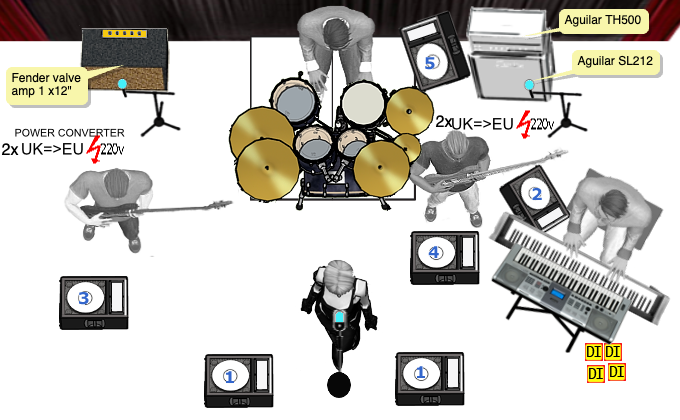Comment réaliser une Fiche technique et plan de scène pro pour vos concerts ? C’est un document essentiel pour tout groupe ou artiste souhaitant se produire en concert. Elle permet aux organisateurs et techniciens de préparer au mieux votre venue et d’assurer le bon déroulement de votre performance. Une fiche technique bien élaborée peut également aider à éviter des désaccords le jour J et à garantir que tous les besoins sont couverts. Voici comment réaliser une fiche technique complète et professionnelle pour vos concerts, en prenant soin de chaque détail.
General information
Start with a brief presentation of your band or musical project, including the style of music you play, your experience, and the number of members. Adding a concise biography can also help organizers better understand your artistic identity. Include contact details for any technical questions, as well as the band’s social networks or website for further information.
Line-up and equipment
List each band member, his or her role, and the instruments played. Also specify the equipment you’re bringing and the equipment you’d like the venue to provide. This includes amplifiers, effects, and any other essential equipment. Be as precise as possible to avoid surprises on the day of the concert, and consider adding photos of certain equipment if this will help understanding.
Plan de scène pro – stage plot
How do you create a data sheet for your concerts? also means integrating a visual diagram showing the position of each musician, instrument and equipment on stage, as well as being able to draw returns and their circuit numbers. This helps technicians prepare the space efficiently. Include dimensions to ensure that everything fits properly on stage, and specify passage areas if this is an important element of your set design.

Patch list
Draw up a table detailing all the instruments and equipment requiring an audio connection, and the type of connection required(mic, DI, etc.). Also indicate which channels each instrument will use on the mixing console. This allows the sound engineer to prepare the mixing console and avoid connection errors.
At LightStagePlot.com, we’ve even included “mic 2” as a second choice of microphone to make it easier for the technician to welcome you.
Below we see “other”, which allows you to enter, for example, the musicians’ first names, or details such as “supplied”, which means that you come with this microphone.
And finally, microphone stands, large or small

Specific technical requirements
Sound
Technical sheet and stage plan
Specify your sound requirements, including :
- Front diffusion system (FOH)
- Stage monitor
- Mixing console
- Desired effects (reverb, delay, etc.)
Indicate whether you’ll be bringing your own sound engineer, and detail his or her role during the concert (e.g. managing the sound system, supervising sound checks, etc.). This can help organizers coordinate rehearsal schedules and equipment needs.
Backline
Detail the equipment you would like the venue to provide, such as amps or drums. Be specific about preferred makes and models. If you have special requirements for amplifiers or drum sets, mention them. This may include preferences for specific sounds or equipment that has worked for you at previous gigs.
Lighting

If you have any special requests for the lighting, please mention them in this section. This includes specific lighting effects, the color of the lights, and the type of ambience you want to create. Please feel free to attach visual examples to illustrate your wishes.
Concert duration and schedule
Indicate the approximate length of your set and, if possible, provide a setlist. This helps with lighting planning and estimating the time needed for sound checks. Also indicate the length of any breaks between songs, and whether you have any interludes or transitions planned.
Reception and special requests
Specify your hospitality needs, including :
- Number of dressing rooms required
- Catering (meals, drinks)
- Accommodation
Feel free to include any special requests that would enhance your comfort and performance, including items such as preferred drinks, snacks, or special arrangements for your members. It also shows that you’re professional and care about every aspect of your performance.
Tips for an effective technical data sheet: follow these recommendations to ensure that your document is useful for everyone. A well-designed data sheet not only facilitates the work of the organizers, but also enhances your own experience on stage.
- Be clear and concise while providing sufficient detail
- Use tables, bulleted lists and diagrams to enhance readability.
- Regularly update your data sheet as your setup evolves.
- Adapt your technical specifications to the size of the venue and the type of event.
- Remain open to compromise if the venue can’t meet all your requirements.
By following these tips, you’ll create a professional technical file that will make organizing your concerts a whole lot easier. Good communication with the technical teams is the key to a successful performance, and don’t forget that your data sheet reflects your professionalism. Make sure it’s well presented and clear to all stakeholders.
